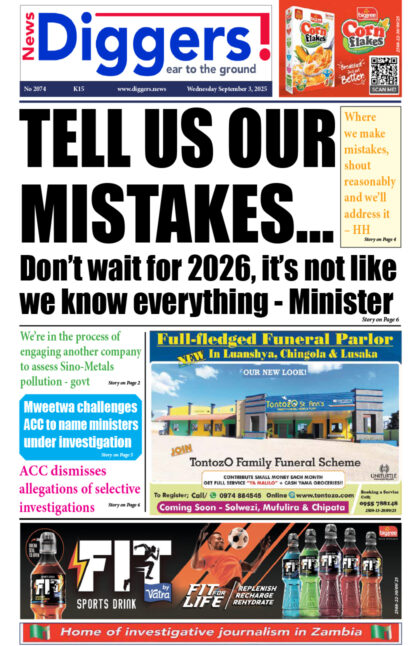IT is essential to understand why freedom of expression and the accompanying media freedom are inextricably linked to free and fair elections. These freedoms are not only essential to political parties or the media, but to the voters as well, thereby providing a useful indicator of what principles to include when we are structuring our electoral guidelines.
This perspective furthermore is a useful tool to use in assessing the relevance of specific requirements or rules that we might want to consider applying during an election period, such as equal public media allocation of time and space to political parties and candidates. If we deny all other political players equal access to the media, we are infringing on the rights of the voters who actually fund the operations of those public media houses through their taxes.
There must be no reason why the president of UNIP or MMD or UPND or indeed any other political party should be denied airtime on the national broadcaster. Everybody pays TV levy and we do not think that citizens pay that TV tax in order to see only those in power campaigning.
As we head towards the 2021 general elections, there is need for media houses, especially those that are funded by taxpayers to provide equal coverage to all political players. It has become a norm in Zambia today that public media is a mouthpiece of government officials; it has become a norm that public media is for the party in power; it has become a norm that the opposition can only get coverage from private media. This is wrong.
The Zambia National Broadcasting Corporation, Times of Zambia, Zambia Daily Mail and the state owned news agency, ZANIS, are required, by law to provide a service to all citizens of this country and this includes those who participate in politics. Both members of the ruling party and the opposition are tax payers who deserve coverage from state media.
We are concerned that a continuation of biased coverage from these public media houses is disadvantaging the opposition. Television and newspaper coverage during the pre-campaign and nomination period is supposed to be fair if we are to provide a level playing field. But the ruling party always benefits from positive, extensive coverage in the government-owned television and press. While opposition television and radio programmes are labeled “political adverts,” the ruling party uses news coverage as an opportunity to campaign.
State media resources belong to the people of Zambia and should be used in a way that benefits all Zambians. The misuse of public assets has a profound negative effect on the general public as it leaves people feeling taken advantage of and thus reinforces voter frustration and apathy.
What is even worse for Zambia is that those private media houses that choose to offer a platform to the opposition become targets for closure and attacks from political cadres from the ruling party. All the recent cases that we have heard of media attacks by the PF, it has been against media houses featuring leaders of the opposition.
As Zambia slides into the formal campaign period, we want to see the Zambia National Broadcasting Corporation televising one-on-one interviews with presidential candidates. This is what it means to create a level playing field. We want to see lead stories in the Zambia Daily Mail and Times of Zambia talking about the opposition and what their leaders intend to do when they form government.
ZNBC and its sister public media houses are publicly financed institutions and as such should be available to all political parties. The independence of the Electoral Commission of Zambia allows it to take a public stance in support of this kind of equitable media access. The Commission must therefore engage the national broadcaster and all other government-controlled media to proceed with television and radio broadcasts and debates in an effort to better inform the electorate.
Such attempts to provide the much needed voter information in the months to come is what will reflect positively on the overall political environment. For future elections, the Electoral Act should be amended to provide for airtime for all registered political parties and independent candidates. Our country needs to recognise the fact that equal access to the media, freedom of expression and political debate is fundamental to free, fair and genuine elections. The UN Special Rapporteur for Freedom of Expression has, for example, noted that an election can be declared free but not deemed fair when there is differential access by political parties to public media in particular.
PF must be tolerant to the opposition. They don’t own any of the public media houses. This trend of political intolerance and state interference using public media operations must also concern other stakeholders such as the diplomatic community and civil society organisations. This approach of disadvantaging the opposition by members of the ruling party is neither desirable nor welcome in a democratic state such as Zambia. Denying other political players access to public media amounts to rigging an election and it must be stopped!
























